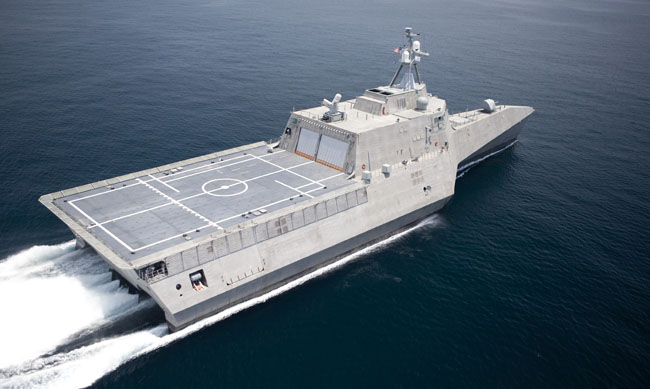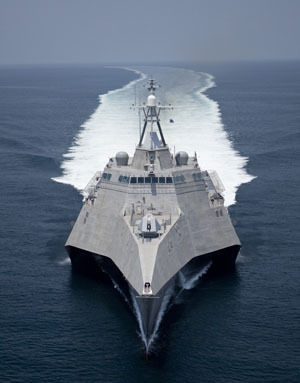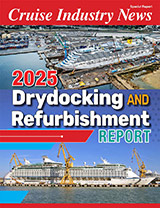
LCS2 “Independence”, the innovative high-speed trimaran combatant ship being constructed by shipbuilder Austal USA in Mobile, Alabama, as part of the General Dynamics Littoral Combat Ship Team, successfully completed a series of tests known as builder’s trials on October 18 in the Gulf of Mexico. The trials included more than 50 demonstration events that rigorously test the ship and all of its systems in preparation for final inspection by the Navy before delivery.
Notable achievements during the trials included reaching a sustained speed of 44 knots during the required four-hour full-power run, with a top speed in excess of 45 knots.
Many of the test events were conducted in high sea-state and wind conditions (2.4 metre waves and winds in excess of 25 knots). Despite the weather, the ship repeatedly reached speeds of over 45 knots with propulsion and ride-control systems operating in full automatic mode, proving the effectiveness of the control systems and the highly efficient and stable characteristics of the trimaran hull form.
A series of high speed ahead and astern maneuvers in these sea state conditions proved the effectiveness of the ship’s four steerable water jets. During the repeated high-speed turns the ship demonstrated excellent agility and stability characteristics.
The ship’s flight deck remained stable despite sea state conditions and maneuvers.
The ship’s open architecture computing infrastructure (called OPEN CI), a highly flexible information technology backbone that integrates the ship’s combat, damage control, engineering control, mission package and other onboard computing functions, also proved its effectiveness during the trials. The OPEN CI ‘any display, anywhere’ capability was extremely valuable in enabling the LCS 2 crew to electronically reconfigure the bridge area and, at long range, the Core Mission System successfully detected, engaged and eliminated a simulated cruise missile attack by a small, fast-moving jet aircraft. In addition, the LCS 2 crew was able to access detailed performance and operation data from the bridge while the ship was operating, thereby providing them with real-time insight as to how the ship systems were performing.
Jeff Geiger, president of team-leader Bath Iron Works, was on-board for the ship’s high-speed trials on October 15. He said, “Independence exceeded our expectations in terms of maneuverability, stability, handling and speed. We are very pleased to be one step closer to delivering this highly capable, versatile and lethal platform to the United States Navy.”

In addition, Geiger praised the builder’s trials team for a job well done: “I’m proud of this entire team of professionals, including Navy representatives from SUPSHIP, Bath and Washington, D.C., who were beside us every step of the way, for their hard work and perseverance.”
Upon returning from the full-power trial, Joe Rella, president and chief operating officer of Austal USA, remarked: “The LCS did extremely well. Mobile and Alabama can be justifiably proud of their shipbuilders.”
The Littoral Combat Ship is a major part of the Navy’s plan to address asymmetric threats in the 21st century. Intended to operate in coastal areas, the ships will be fast, highly maneuverable and equipped to support mine detection/elimination, anti-submarine warfare and anti-surface warfare mission.
The ship’s highly flexible OPEN CI design, developed and integrated by a General Dynamics Advanced Information Systems team, allows “plug and play” integration of both the core systems and the LCS mission modules. It meets Navy open architecture requirements, strictly adheres to published industry standards and facilitates the integration of commercially available products.
General Dynamics Bath Iron Works is the prime contractor for the General Dynamics Littoral Combat Ship Team. Partners include shipbuilder Austal USA (Mobile, AL); General Dynamics Advanced Information Systems (Fairfax, VA); BAE Systems (Rockville, MD); L3 Communications Marine Systems (Leesburg, VA); Maritime Applied Physics Corporation (Baltimore, MD); and Northrop Grumman Electronic Systems (Baltimore, MD).
Austal’s Mobile facility currently employs almost 1,000 workers and is the largest aluminium shipyard in the world. In addition to the LCS, recent projects have included construction of the largest-ever aluminium ferry in the United States. Austal is also in the pre-construction design phase on the first Joint High Speed Vessels (JHSV) for the U.S. Department of Defense.
Bath Iron Works employs approximately 5,700 people. Since 1991, BIW has manufactured and delivered 31 Arleigh Burke-class destroyers; the shipyard is also building the lead ship of the Navy’s Zumwalt (DDG 1000) class of guided missile destroyers.
General Dynamics Advanced Information Systems is a provider of end-to-end mission solutions in systems integration, development and operations support to customers in the defense, intelligence, space and homeland security communities. The company integrates land, air, sea, space and cyber assets to facilitate the collection, exploitation, analysis and dissemination of mission-critical intelligence information.
General Dynamics, headquartered in Falls Church, Va., employs approximately 92,000 people worldwide. The company is a market leader in business aviation; land and expeditionary combat systems, armaments and munitions; shipbuilding and marine systems; and information systems and technologies.



